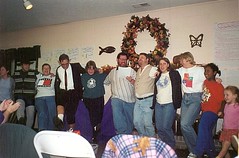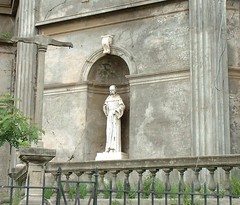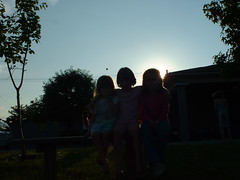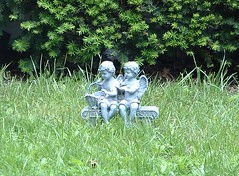Life at Jeff Street
Jeff Street Baptist Community at Liberty. It's a confusing mouthful for a group that might better be known as the Church, formerly of Jeff Street, formerly Baptists (and Catholics, Presbyterians and given-up-hope) which is now at Liberty, literally and figuratively. We are a mutt. The wretched refuse. The divine community. God's Kingdom come. Welcome. [Disclaimer: The views within this blog are doubtless pretty cool. Nonetheless, views expressed are those of the individual and not Jeff Street.]
Wednesday, June 29, 2005
Tuesday, June 28, 2005
Hagar's Story
We've been tackling "Stories to Struggle With" this summer, having sermons and reflections on some of the Bible's more difficult stories (God telling Abraham to kill Isaac, for instance). One of the great things about Jeff Street is hearing guest sermons from our members, which are always inspiring. That's certainly the case with this sermon from a couple of Sunday's ago from one of our young adults, Cindy Guertin.
You gotta give her credit, not only preaching a sermon but doing so on such a difficult story. And then to do it with the grace and insight she did is simply transforming. Thanks, Cindy.
======
After church two weeks ago, Natalie and I were reflecting on the “Stories to struggle with” we had been hearing about in recent sermons. We both shared the difficulty we have at times in claiming this book as our sacred scripture... Later that day I was listening to NPR and the voice of Julia Sweeney, a former Saturday Night Live comedian, came on the air. She was reading from her one-woman show called “Letting Go of God.”
She said, “I knew the bible had nutty stories, but…I guess I thought they’d be wedged in amongst an ocean of inspiration and history. But instead the stories just got darker and more convoluted. Like when God asks Abraham to murder his son Isaac. As a kid we were taught to admire it. I caught me breath reading it. We were taught to admire it? What kind of sadistic test of loyalty is that…to ask someone to kill his or her own child? And, isn’t the proper answer ‘Noooo, I will NOT kill my child, or any child?’ . . . Some people argue that without the Bible, morality would be relative and wishy-washy…But in the BIBLE morality is relative and wishy-washy. In fact, it sure seems like our modern morality is much more loving and humane than the Bible’s morality…God is so offensive in the Old Testament. I mean like bi-polar…”
Last week Cindy preached about the story of God asking Abraham to sacrifice his son. That story is found in Genesis wedged between two accounts of Hagar the Egyptian slave—the person whose story we’ll hear today. Until recently, I had never really paid much attention to Hagar. But just like Julia Sweeney said, on reading it again as an adult the story catches my breath. It wasn’t that I was taught to admire her story—rather, I was taught to ignore it, probably for many reasons:
She doesn’t matter much in the big picture, which is really about Abraham and God’s promises to Abraham and his offspring... Hagar gets neglected in the patriarchal setting of her time, and her story gets easily lost today in the ongoing patriarchy and sexism of the Christian church.
Hagar is probably very young, perhaps a teenage girl, and her story is unimportant when told beside the much older matriarch of the faith, Sarah. As a young person her story and her feelings are discounted. I wonder if that sounds familiar to you youth that are here. Doesn’t it seem so unfair when adults say that kids should be seen and not heard, or when adults ignore your feelings or aren’t interested in the things that are really important to you? I think it probably happens to every kid sometimes, because every adult sometimes does it whether on purpose or by accident, because when they were kids they were told by an older person that they weren’t important.
Hagar is also a poor servant; so often people from lower social classes are ignored by the wealthy. The sufferings of the poor rarely make the headlines. It’s embarrassing in such a rich nation to recognize that there is poverty all around us; that the rich benefit at the expense of the poor.
In the Judeo-Christian tradition, our focus is on Abraham and Sarah and their son Isaac because these are the founders of our faith tradition. As Christians we pay little attention to Hagar’s story, but she becomes the ancestor of the Islamic nations through her son Ishmael and is revered in the Muslim tradition as a strong and faithful woman. But important figures of other faith traditions are often of no consequence to us, because we so easily live into feelings of religious superiority.
But most of all, I think I never paid attention to Hagar’s story before because as a white person it’s not a familiar story. Hagar is a black maidservant from Africa, and she gets used and abused by her lighter-skinned owners. By my white privilege, her story is largely unfamiliar to me.
But for Renita Weems, who is an African American theologian, Hagar’s story is prominent. In her book Just a Sister Away, Dr. Weems writes, “For black women, the story of Hagar in the Old Testament book of Genesis is a haunting one. It is a story of exploitation and persecution suffered by an Egyptian slave woman at the hands of her Hebrew mistress. Even if it is not our individual story, it is a story we have read in our mothers’ eyes those afternoons when we greeted them at the front door after a hard day of work as a domestic. And if not our mothers’ story, then it is certainly most of our grandmothers’ story. For black women, Hagar’s story is peculiarly familiar. It is as if we know it by heart.”
I invite all of us now to hear Hagar’s story…whether it is one we know by heart, or one we’ve never really stopped to consider.
======
by Cindy Guertin....more to come!
Hagar's Story, cont'd...
This is a story tainted by layers of sexual and economic exploitation, racism, patriarchy, youth oppression, classism…it’s even a story that flows into centuries of history of interfaith conflict.
We cannot, of course, read this ancient text fairly if we place on it all of our cultural baggage around modern concepts of race relations, white privilege, chattel slavery, or our cultural ideal of monogamy. This story is 3,000 years old, from a time when these sorts of family arrangements were the norm for a wealthier family. For barren women like Sarah, using a concubine to conceive children was important for the family to retain its land and property. A woman’s social status was directly connected to her husband and the number of children she bore him…particularly male children. And although this story is about an Egyptian who is serving her prosperous Hebrew masters, slavery was a common practice in many ancient cultures and not linked to a racial divide in the same way that American slavery was; we also remember that soon their fates are reversed and it is the Israelites who are slaves in Egypt.
But still, cultural differences aside, it’s hard to listen to it without finding it terribly offensive. Why are these stories in our sacred scriptures? Is there anything redeeming about them? Phyllis Trible in her book Texts of Terror struggles with some of the most difficult, painful stories in the Old Testament where women are victimized. She says, “If art imitates life, scripture likewise reflects [life] in both holiness and horror. Reflections themselves neither mandate nor manufacture change; yet by enabling insight, they may inspire repentance. In other words, sad stories may yield new beginnings.”
I looked hard for a way to make sense of this story, to explain it away or to make it more palatable as a story I can claim in my bible, and from my faith tradition. But Trible warns, “Sad stories do not have happy endings.” Not all the biblical stories are redeeming, and what makes them so painful to hear is not just that we can’t always understand what God is doing in them, but that they are also very real stories about us, and in them we see reflections of the sometimes terrible ways we treat each other.
Dr. Weems writes, “The story of the Egyptian slave and her Hebrew mistress is hauntingly reminiscent of the disturbing accounts of black slavewomen and white mistresses during slavery. Over and over again we have heard tales about the wanton and brutal rape of black women by their white slavemasters, compounded by punitive beatings by resentful while wives who penalized the raped slavewomen for their husbands’ lust and savagery.”
Sarah—as a woman so dependant on her husband and on her infertile womb—doesn’t really have much power in this story either. But she uses what power she does have to exploit another woman in hopes that her status will be elevated. But her plan backfires. Once Hagar is pregnant, the text says Hagar regards Sarah “to be of no account.” Hagar gains a bit of influence for a small moment as Abraham’s second wife, and hurts Sarah back by disregarding her role. So Sarah complains to Abraham and Abraham allows Sarah to “do to her as you please.” According to the text, Sarah “treats Hagar harshly”…which means that she physically abuses her to the point that Hagar if forced to flee into the desert wilderness—where she will likely die—in order to escape her mistress.
This is the cycle of oppression. As Natalie often says when she witnesses cruelty, “It takes hurt to give hurt.” In reality both of these women are victims of their patriarchal culture. There doesn’t seem to be enough blessing to go around, and so they both step on each other in the race to climb the ladder out of privilege...
Dr. Weems writes that while she is the great-granddaughter of a slave, as an educated and employed woman she is “painfully aware” of her potential to exploit other women when she steps across the floor recently mopped by the black janitor at the office building where she is late for an executive meeting. “And I am reminded of my privileges,” she writes, “when, while sitting at a desk in my hotel putting the final touches on a speech for an organization of Christian women, the Latina maid tiptoes in to replace my soiled linens and make my bed.”
She goes on to say: “None of us is safe from the ravages of a society which makes room for only a chosen few and keeps at bay the vast majority. For those of us who are educated and employed there is always the potential to be a Sarai: and, lamentably, there are far too many opportunities in a capitalist society for her to surface. Yet most of us are just a paycheck away from Hagar.”
So---we can learn some really painful and hard, but necessary lessons from the story of Sarai and Hagar. Phyllis Trible says “All we who are heirs of Sarah and Abraham, by flesh and spirit, must answer for the terror in Hagar’s story. To neglect the theological challenge she presents is to falsify faith.”
------
by Cindy Guertin, who knows of which she speaks
Hagar's Story, cont'd...
My privilege of being white and educated and American and Christian in this nation make me a child of Sarah and Abraham, and not of Hagar. I have my Hagar moments of being oppressed by evil powers like sexism and homophobia, but I hope that I can authentically listen to Hagar’s story without being so anxious to share mine. I hope I can seek out the Hagar in those I oppress, whether intentionally or not, and have the courage, as Weems says, “to take the enormous risk of opening up the deep festering wounds between us and begin to explore our possibilities for divine healing.”
So there’s the lesson—the story may enable insight or inspire repentance …but does the lesson learned redeem this story? I mean, where is God in the midst of this horrible story? In struggling through this story there are two places I have found the God I know and can claim.
First, while both women are oppressed and are working out of a sense that there’s not enough of God’s blessing to go around, as their interwoven story continues, BOTH are recipients of God’s blessing. Hagar receives a promise of multiple offspring that sounds almost identical to the one God gives Abraham! God gives both what they need most to survive in their world—the promise of an abundance of ancestors. This reminds us that while we race the oppression Olympics, we must remember that there is a just and equitable way to distribute resources and privileges so that all people can enjoy the promise of God’s abundance. Both women become matriarchs of great nations—Sarah of Israel and Hagar of Islam.
And second, this story is redeemed for me when we look closer at Hagar’s experience in the wilderness. Hagar, after all, is the epitome of an outsider—she represents a person for whom so many of life’s oppressions intersect: racism, sexism, poverty, homelessness, patriarchy, slavery, classism…she is used, abused, and rejected. And yet Hagar is the only person in the entire Bible who is given the privilege and power to name God. Throughout the Bible, humans are allowed to name people and places, but never the Holy God. Yet here a woman, an outsider, the one oppressed in every way by her society, names God. She calls God “the God who sees”—the God who pays attention to the afflicted; the God of the nobodies…who hears the pain of the wounded ones, sees their oppression, and does not abandon them in their wilderness.
And so even though Hagar’s story is painful, and even if the morality in it appears wishy-washy to us, ultimately it is a story I can claim as a part of my scripture because I see glimpses of God and opportunities for healing in it. Maybe Hagar’s story is one we can all re-claim.
======
by Cindy Guertin, who is some kind of wonderful
Thursday, June 23, 2005
Lott Carey
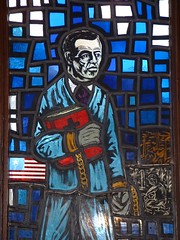
Stained Glass Liberia
Originally uploaded by jeffstreet1.
Lotte Carey was a Baptist slave who bought his freedom, then the freedom of his wife and children; later he served as a missionary to Liberia.
Wednesday, June 22, 2005
Part of a larger sermon...
...that I may put here later. For now, this following great story comes courtesy of our pastor.
One of the things that [community organizer] Robert Linthicum reminded us of this week was that we need to reflect, reflect, reflect. For example, when we decide to take on a particular issue, before we just jump on in there head first, we need to do a power analysis. Who has the power to make a difference here? How do we engage that power? Is this issue winnable? How do we win it?
He told the most wonderful story about his church in Edgewater, which is a Chicago neighborhood, and how they realized that the local bank had quit giving home improvement loans to people in their community. A group of pastors went to talk to the secretary of the mayor about it, and they went there because she was a member of one of the churches. They told her that they thought that that bank was red-lining – refusing loans to everyone within a particular district.
The secretary said that she was horrified to even think that they would think that, and then she reached into her drawer and pulled out a file, and put it on her desk and patted it several times and told them to make themselves at home, that she needed to step out to freshen up for a few minutes. Now, that's what Johnny Ray Youngblood, a well-known organizing pastor in New York City, calls “a saint in Caesar's palace.”
Anyway, when they opened up the file, as they very quickly did, they saw that things were worse than they'd even imagined. The bank was red-lining, and the reason was that the city was planning to let the neighborhood get so bad, without anyone being able to access home improvement loans, that they would then proclaim imminent domain. And there in that file, all the plans for this were laid out. They already had drawings of the new neighborhood that would be built!
Well, they were blown away, as you can imagine, and suddenly began to realize why the police didn't respond to emergency calls, why the garbage wasn't being picked up, etc. It was all part of the plan to decimate the community.
Now, there are a lot of things that they could have done. There were a lot of different ideas floating around, but they did some serious reflection. They did a power analysis. They asked, who has the power to make a difference here? And how do we exert our power upon him or her?
This is what they did. They went in to visit the president of the bank, and they said, "We know that you are red-lining, and we want it stopped. We know that there are five people who sit on a committee that decides who gets loans and we want six people from our community, who we appoint, to be on that committee, beginning with a meeting tomorrow."
Well, the bank president hemmed and hawed and said, “No. I won't do it.”
So they rolled out a scroll, and they asked, “What do you see?”
He said, “Well, I see a list of about twenty churches and synagogues.”
And they said, “Yes. And each one of those twenty churches and synagogues has their accounts in your bank. And we have signed affidavits from each of these churches that on a certain day, at a word from us, each of them will withdraw their money from your bank.”
“Oh,” he said. But that wasn't enough to make him do what they wanted.
So they rolled out the scroll a little more. “What do you see?” they asked.
The names of the churches that hold their endowments in his bank.
The names of every small business in the neighborhood.
The names of 9,000 individuals who hold their savings in his bank.
Well, guess what happened? The bank president decided that, for the good of the community, he would invite those six community members to serve on the committee, which he convened the next day. The bank began to give out loans again, and the city dropped its plans to decimate and redevelop the community. Linthicum says that to this day, Edgewater is one of the healthiest neighborhoods in Chicago.
I love that story! There are so many different things that they could have done, so many ways they could have gone. But they reflected together on what would be most effective, and then came up with a game plan that worked.
So let's spend some time in the desert with Jesus. Let's pray and reflect alone, and with each other. Let's figure out what we need to be about in order to transform our world. And then let's do it.
======
by pastor Cindy, who's one righteously tough chick, herself
Tuesday, June 21, 2005
Stained Glass Saints
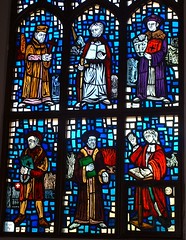
Stained Glass Saints
Originally uploaded by jeffstreet1.
Can you name them?
(from the windows of Highland Baptist Church in Louisville, KY, which has a wonderful selection of individuals in church history in her windows)
Friday, June 17, 2005
Philosophy of Education
I believe in books, worn from joy.
I believe in growing gardens.
I believe in humongous, ridiculous-sounding words
like "obfuscation."
I believe in cute little words like "booger."
I believe in questioning authority and in
authorizing questions.
I believe in noisy classrooms that refuse to stay still.
I believe in that little spark in a kid's eyes that says,
"I don't know nothin' 'bout school, but I want
to KNOW. I want to know what makes an
engine go. I want to know how birds fly. I
want to know where babies come from and
where people go when they die. I want to
know where the river begins and ends. I
want to know about boats and basketball
and pirates and buried treasure and space
ships and martians and mice that swordfight
and why we have to poop."
I believe that such a spark exists in every child.
I believe that such a spark can be extinguished.
I believe that it is the job of teachers and parents
and good people everywhere to encourage
that spark, to fan it until it becomes a flame,
until it becomes a forest fire which is not
extinguishable and which feeds itself.
I believe that the job of a teacher is to tap into that
very real desire to know - no matter how
deeply buried it may be or how cleverly
disguised. Once that motivating desire is
discovered, I believe that all teachers have
to do is allow that desire to lead the child into
the reading and math and science that will
enable that child to be a lifelong learner.
I believe that there is too much to know for teachers
to teach it all. Thus, I believe that a teacher's
main job is to give children the gift of curiosity.
I believe in treating children as much like adults as possible.
I believe in letting children be children.
I believe that poetry and science and art and reading
and PE and music and history and math and
digging dirt are all related and education is
what happens when you try to figure out how.
======
by Dan Trabue, who wishes all of our teachers a restful summer
Thursday, June 16, 2005
Thursday, June 09, 2005
Vernon Easterhare Declares:
There comes a time when I conclude that the doing I do serves all the more good than knowing every word of every line in all my several books. And, my, my, my, how short it seems on the doing of the Word for all the striving for knowing that has made my life both insulated and self-involved!
The disciple is nothing but a student, and Jesus would have that one first obey, then gather facts. This constitutes a great shift away from Rabbinical culture, where Talmudic students would exchange gemara – oral arguments on the Mishnah and Torah – with the Sage in a way suggested in the Gospels between the Pharisees/lawyers/scribes and Jesus. But Jesus' disciples seem to be in the first instance there to learn a new moral understanding, really a transformation of an ethic of lovingkindness into the Sovereignty of God, with a radical and all-encompassing emphasis. The notion of lovingkindness and the Realm of God were, of course, not new to Judaism, but the fervor was a new flowering of the moral world.
Siblings in Jesus, I tell you that sometimes I amount to a bad disciple, but a fair Talmudic student, by which I mean I get bogged down in my studies about this-or-that papyrus or Aramaicism or 'Q' or somebody's theory of NT hermeneutics and slip on being sufficiently kind, or in being responsible for my dependent kitty and fellow churchfolks and the homeless and the vulnerable, victimizable animals. Pray that it be otherwise!
I have headstrong tendencies, but the older I get, the younger in Jesus I get; obstinacy is psychically sick, and what one takes in the place of hard opinions of an opinionated person, I need to install play-which-is-true-play – namely, service.
======
by Vernon Easterhare, who is a model "do-er of the Word," despite his protestations to the contrary
